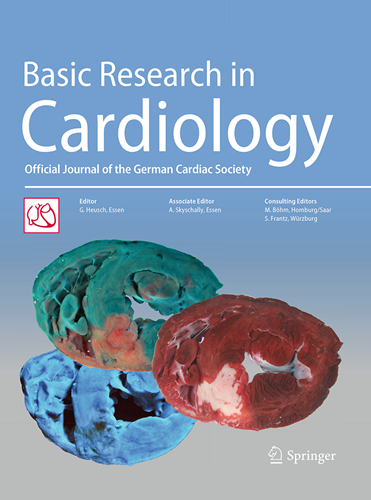CNP类似物vosoritide在stz诱导的1型糖尿病小鼠心脏中介导pde2敏感的抗心律失常作用。
IF 8
1区 医学
Q1 CARDIAC & CARDIOVASCULAR SYSTEMS
引用次数: 0
摘要
糖尿病引起不良的结构、电生理和自主神经重构,增加了危及生命的心律失常的风险,特别是在急性心肌梗死后。利钠肽(NPs)显示越来越多的证据对抗心律失常。我们之前的研究表明,c型NP (CNP)通过cgmp依赖性磷酸二酯酶2 (PDE2)降低健康小鼠缺血再灌注损伤(I/R)后的心律失常。然而,由于其血浆半衰期短,CNP的临床应用具有挑战性。为了解决这个问题,我们研究了更稳定的CNP类似物vosoritide (VO)是否能降低stz诱导的1型糖尿病小鼠细胞和器官水平的心律失常(50µg/g, i.p. 5天)。5周后,STZ治疗导致体外灌注心脏的血糖和HbA1c水平升高,心功能受损,I/R后心律失常发生率增加。在糖尿病小鼠和伴有扩张型心肌病的糖尿病患者中,心脏PDE2表达也同样升高。值得注意的是,cgmp通过VO介导的PDE2激活明显减少了糖尿病小鼠体外灌注心脏I/R后心律失常的产生(Cohen’s d = 2.3)。在心肌细胞中,VO显著降低β-肾上腺素能应激时的促心律失常信号,如自发Ca2+波和火花(Cohen's d = 1.0)或l型Ca2+电流振幅(Cohen's d = 1.6)。特异性PDE2抑制BAY 60-7550或遗传性心肌细胞特异性PDE2缺失可阻止抗心律失常VO作用。重要的是,VO不影响QT间期、动作电位持续时间或糖尿病小鼠心肌细胞的收缩。因此,修饰的利钠肽VO可能作为一种有希望的治疗选择,以防止致死性心律失常的易感糖尿病患者。本文章由计算机程序翻译,如有差异,请以英文原文为准。
The CNP analogue vosoritide mediates PDE2-sensitive anti-arrhythmogenic effects in mouse hearts with STZ-induced type 1 diabetes.
Diabetes mellitus induces adverse structural, electrophysiological and autonomic remodelling increasing the risk for life-threatening arrhythmias, particularly after acute myocardial infarction. Natriuretic peptides (NPs) show increasing evidence of antagonising arrhythmia. Our previous study demonstrated that C-type NP (CNP) reduces arrhythmia after ischaemia-reperfusion injury (I/R) via the cGMP-dependent phosphodiesterase 2 (PDE2) in healthy mice. However, the clinical use of CNP is challenging due to its short plasma half-life. To address this, we investigated whether the more stable CNP analogue vosoritide (VO) reduces arrhythmia at cellular and organ levels in mice with STZ-induced type 1 diabetes (50 µg/g, i.p. for 5 days). After 5 weeks, STZ treatment led to elevated blood glucose and HbA1c levels, impaired cardiac function, and an increased incidence of arrhythmia after I/R in ex vivo perfused hearts. Cardiac PDE2 expression was similarly increased in diabetic mice and diabetic patients with dilated cardiomyopathy. Notably, cGMP-mediated PDE2 activation via VO clearly reduced arrhythmia generation after I/R in ex vivo perfused hearts from diabetic mice (Cohen's d = 2.3). In cardiomyocytes, VO significantly decreased pro-arrhythmic signals upon β-adrenergic stress, such as spontaneous Ca2+ waves and sparks (Cohen's d = 1.0) or L-type Ca2+ current amplitudes (Cohen's d = 1.6). Specific PDE2 inhibition with BAY 60-7550 or genetic cardiomyocyte-specific PDE2 deletion prevented the anti-arrhythmic VO effects. Importantly, VO did not affect the QT interval, action potential duration, or contraction of cardiomyocytes from diabetic mice. Thus, the modified natriuretic peptide VO may serve as a promising therapeutic option to prevent lethal arrhythmias in susceptible diabetic patients.
求助全文
通过发布文献求助,成功后即可免费获取论文全文。
去求助
来源期刊

Basic Research in Cardiology
医学-心血管系统
CiteScore
16.30
自引率
5.30%
发文量
54
审稿时长
6-12 weeks
期刊介绍:
Basic Research in Cardiology is an international journal for cardiovascular research. It provides a forum for original and review articles related to experimental cardiology that meet its stringent scientific standards.
Basic Research in Cardiology regularly receives articles from the fields of
- Molecular and Cellular Biology
- Biochemistry
- Biophysics
- Pharmacology
- Physiology and Pathology
- Clinical Cardiology
 求助内容:
求助内容: 应助结果提醒方式:
应助结果提醒方式:


